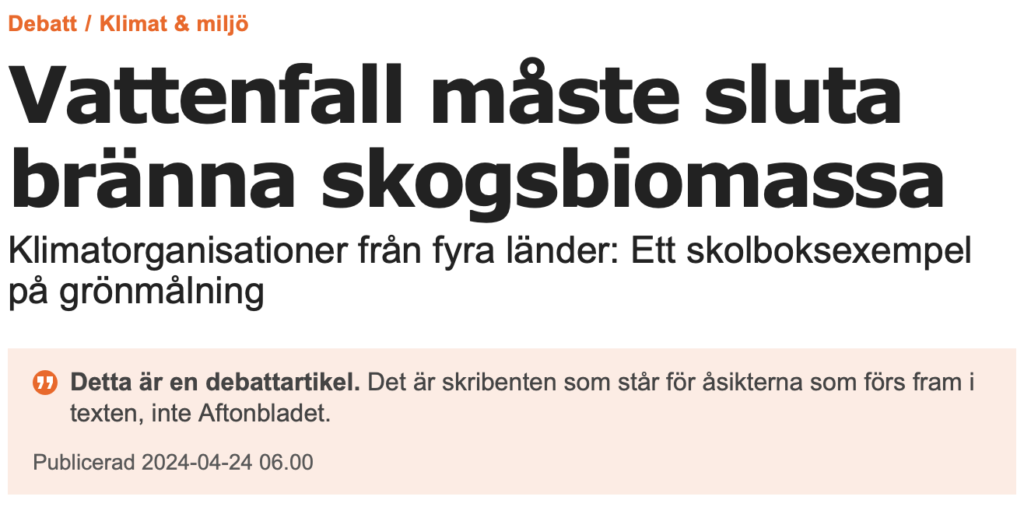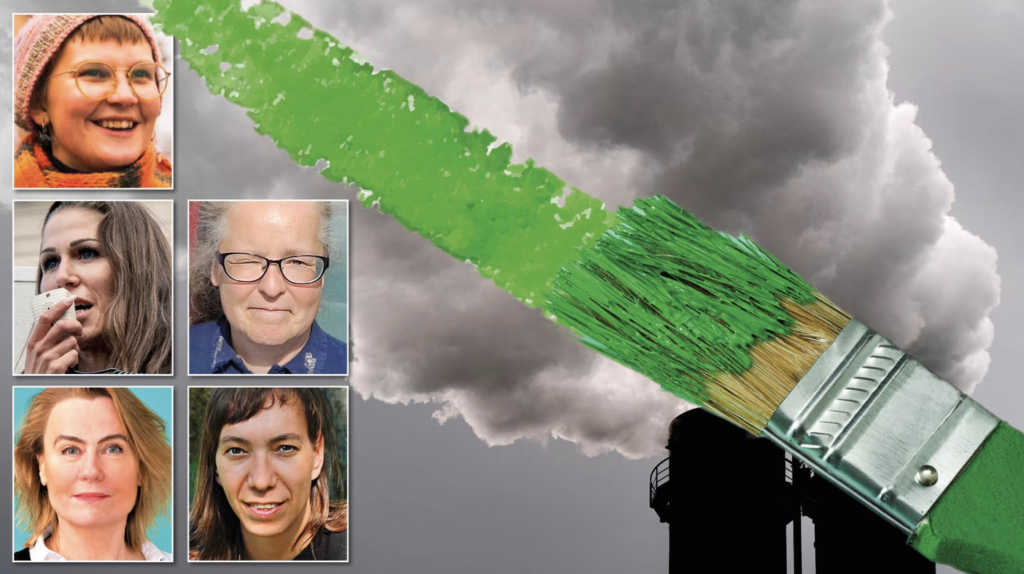‘Sustainable biomass’ does not exist. Nevertheless, Vattenfall continues to build biomass power plants in Sweden, Germany and the Netherlands (het Parool, May 3rd, 2024)
Opinion, het Parool | may 3rd, 2024
Also published in the Swedish Aftonbladet
Over the past five years, as every year on the day of the annual shareholders’ meeting in Sweden, we have called on Vattenfall to stop its plans for new biomass power stations in Europe, including the Netherlands. Vattenfall talks about ‘sustainable biomass’, but by far the most wood (72 percent) that is burned in our biomass power stations in Sweden, Germany and the Netherlands comes from Sweden. Here, forestry practices are among the worst in the world. More than 97 percent of all logging is done through so-called ‘regeneration logging’. This means cutting down biodiverse forests, followed by planting monoculture trees. We are not losing twigs and twigs, but, due to the continued logging expansion of Vattenfall, we are losing irreplaceable forests and ecosystems.


Empty terminology
“It certainly sounds good to the general public that Vattenfall constantly speaks in its campaigns worldwide of: ‘net zero by 2045’, ‘fossil-free’ and ‘sustainably produced biomass’. But the concept ‘fossil-free’ is of course completely meaningless if it is replaced by an even more polluting alternative such as the systematic burning of forest biomass for energy”.
We have therefore spent five years urging Vattenfall to cancel its plans for new biomass power stations, stop importing and trading wood pellets and shift its money and focus to truly clean energy and energy efficiency.
But Vattenfall is once again turning its attention to the millions of euros in state subsidies, and then spending this money on large-scale greenwashing and fighting us in court. For example, Vattenfall has started the construction of a new biomass power plant in Sweden. They have submitted a preliminary application for a new 90 MW biomass power plant in Berlin, and again applied for and were (unlawfully) awarded subsidies for the construction of Europe’s largest 120 MW biomass power plant in Diemen. The Clean Air Committee has again appealed against the latest award.
A short tour through Sweden, Germany and the Netherlands also shows the following.
Biomass combustion in Sweden
Vattenfall in Sweden has 13 biomass power stations. Vattenfall has commissioned a new biomass power plant in Uppsala (110 MW) in 2022, the second largest wood-fired plant to date. Vattenfall is also building a new biomass power plant.
Germany
At the end of 2023, Vattenfall agreed to sell its heating network and assets to the city of Berlin in 2024. Nevertheless, Vattenfall has submitted an exploration for an application for a large new biomass power plant (90MW) in Berlin. Current biomass burning in Berlin has increased by just over 8,000 tons per year.
The Netherlands
Despite local, regional and (inter)national opposition (even from Greta Thunberg), Vattenfall has so far refused to withdraw its plans for the construction of the largest biomass power plant in the Netherlands, in Diemen (Amsterdam heating network) of 120 MW. This concerns 200,000 tons of imported wood pellets per year. The environmental permit for the planned power plant was annulled by the Council of State last summer. The subsidy also expired. Nevertheless, Vattenfall again received 400 million euros in government subsidy. An appeal has also been lodged against this by the Clean Air Committee.
Feverishly clinging to government subsidies
Experience shows that Vattenfall continues to frantically hold on to the millions of euros in government subsidies. This money is used by Vattenfall for greenwashing and fight against against the Clean Air Committee in court – instead of implementing an energy transition that combats climate change, forest and biodiversity destruction and air pollution.
Against this background, we have the following questions for Vattenfall:
1. How long does it take for nature to regenerate a branch that was part of a (for example, 130 year) old tree? And how does that compare with the very limited time in which we need to drastically reduce the concentration of greenhouse gases in the atmosphere?
2. What is the carbon debt inherited from so-called “residual biomass” that you purchase from current FSC-certified forestry?
3. Why does Vattenfall only aim to be fossil-free, and not to reduce greenhouse gas emissions? And why only within a whole generation?
4. Why did you decide to spend money on greenwashing campaigns instead of initiating an energy transition for the benefit of climate, air quality, forests and biodiversity?
5. Why does Vattenfall still claim that forest wood biomass energy is a climate solution while the Joint Research Committee (JRC) of the European Commission, the European Academies’ Science Advisory Council (EASAC), the Royal Netherlands Academy of Arts and Sciences ( KNAW) and the IPCC clearly indicate that emissions must be significantly reduced this decade?
6. When can you give us a guarantee that you will no longer do business with forestry companies/subcontractors that establish and maintain climate and environmentally harmful FSC-certified monoculture tree plantations?
7. When can you give us a guarantee that you will no longer do business with forestry companies/subcontractors that cut down biodiverse forests and primary forests?
8. When will you withdraw your plans for a new biomass power plant in Diemen, now that the highest court (Council of State) of the Netherlands has annulled the environmental permit and thus the conditions for eligibility for € 400 million government subsidy have expired?
Finally, there is no doubt that we must immediately put an end to the burning of fossil fuels – this is one of our most important demands to Vattenfall. But we cannot replace them with other, even more polluting and nature-destroying fuels with higher emissions, such as woody biomass.
This text is a shortened version of the letter that the authors sent to Vattenfall Head Office in the context of the annual General Shareholders’ Meeting on April 29, 2024 in Sweden.
Authors
Fenna Swart, chairman of the Clean Air Committee, Netherlands
Agnes Hjortsberg, Friday for Future Sweden
Lina Burnelius, Skydda Skogen, Sweden
Almuth Ernsting, Biofuelwatch, UK
Jana Ballenthien, ROBIN WOOD, Germany
